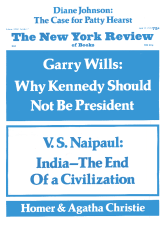In response to:
FBI Mayhem from the March 18, 1976 issue
To the Editors:
Milton Viorst’s “FBI Mayhem” (NYR, March 18) admirably reports some of the criminal activities of the FBI in San Diego, but certain inaccuracies, and consequent over-simplification, deserve correction. The San Diego State campus was not the placid little place prior to the “Bohmer case” that he suggests. (Incidentally, “the larger university branch near by at La Jolla” was then, as it is now, a fourth the size of the mediocre monstrosity.) Contrary to Viorst’s assertion—“nor had aggressive SDS chapters been organized on the local campuses”—the SDS chapter I served as faculty adviser at State in the Sixties was very large, extensively militant, and publicly visible, until broken by factionalism. Similar parochial blinders on Viorst apparently hide also, among others in “visible antiwar activity,” the energetic Movement for a Democratic Military of the late Sixties (and its paper produced by and for dissident sailors, Duck Power). They were persistently harassed by Naval and local police who, unlike Viorst, took them with brutal seriousness. Other antiwar and antimilitary movements, on and off campus, were publicly active—far more so than in Bohmer times—and in trouble with local authorities and others (as I was with Military Intelligence investigators and local patriots, who made repeated threats). Those who know the period must perceive Bohmer’s harassment as the tail end of a multi-official attack on continuing dissidence. Viorst dubiously gives the opposite impression.
Viorst’s account seems to suggest that the troubles of the underground political paper, The Street Journal, were FBI instigated. However, my careful investigation in 1969-1970, part of which was published in The Nation (March 30, 1970)—not altogether “ignored by the press”!—clearly showed repeated direct harassment by the San Diego city police, by identifiable military persons, and by others of less certain identity. That FBI harassment was part of a larger movement by local authorities and other authoritarians does not, of course, remove its own culpability, though it does put it in a more complicated, and perhaps ominous, perspective.
Peter Bohmer may have been a “mild-mannered young man” at times, but not in campus speeches that I heard. Indeed, several of our conservative colleagues and administrators repeatedly told me that his “wildness” and “bad manners” as well as radicalism were part of the justification in pushing “unprofessional conduct charges” against him, as did some conservative students. Academic fatuousness was central to the episodes, and nuclear to such intolerance.
Several of Viorst’s other details could bear a bit of qualification, too, but perhaps this is sufficient to suggest the crucial correction: “FBI Mayhem,” as the San Diego context should indicate, was not isolated, not peculiar to that organization, not separable (from local police, military, rightists, and campus conservatives), not merely Nixonian, and certainly not aberrant. FBI criminality reflected a large and continuing constituency, a long established and widespread mode of response. Sadly, in making a case against a gross organization, Viorst ignores the continuity of the demand for mayhem and its joint nature—narrows, simplifies, reduces the problem. Tidying up the FBI may be desirable but will certainly be an insufficient, and quite possibly a misleading, correction of a vicious institutional order.
Kingsley Widmer
San Diego State University
San Diego, California
Milton Viorst replies:
I have very little quarrel with Professor Widmer’s letter, except that I think that he accuses me of sins which were not committed. My article did not say that there were no radical activities in San Diego or at San Diego State in the 1960s, that depredations were not committed by the local police or that Peter Bohmer was not a zealot. It said radical activities were modest compared to those in other cities and campuses, that the police were frequently in collusion with the FBI. I made it clear both that Bohmer was a dedicated activist and that I found him personable to deal with. As for Professor Widmer’s conclusion, while I was reporting a “case study,” I provided explicit evidence that the practices described were widespread.
This Issue
April 29, 1976



